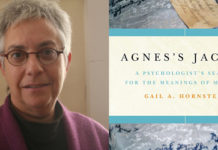Study Highlights Importance of Social Interactions in Psychosis Recovery
Study finds frequency of social interactions predicts long-term remission in first-episode psychosis.
Call For Abstracts: Philosophical Perspectives on Critical Psychiatry
The Association for Advancement in Philosophy and Psychiatry is issuing a call for abstracts, with a particular interest in submissions from service users. The...
Neuroscience-based Treatment Program Proposed for Adolescent Depression
A study published in Frontiers in Human Neuroscience proposes a new model for the treatment of adolescents diagnosed with major depressive disorder (MDD).
“Helping Others Dampens the Effects of Everyday Stress”
"The holiday season can be a very stressful time, so think about giving directions, asking someone if they need help, or holding that elevator...
New Book Deconstructs Ideology of Cognitive Therapy
CBT forwards a hyper-rational perspective of human suffering that complements a managerialist culture of efficiency and institutionalization in the Western world.
“How We Label People with ‘Mental Illness’ Influences Tolerance”
Honor Whiteman reports on a study in The Journal of Counseling & Development, which found that people may be less tolerant of an individual...
Psychologists Argue for Decolonial Approach to Global Poverty
Individualist psychological models of poverty pathologize poor communities, decolonial approaches that emphasize context and interdependence may be more sustainable.
New Collaborative and Feedback-Informed Family Therapy Approach
Attempts to bridge the gap between research and practice result in a family therapy approach which employs clients as co-researchers.
What is Contributory Injustice in Psychiatry?
An article on contributory injustice describes the clinical and ethical imperative that clinicians listen to service users experiences.
“Does Psychoanalysis Have a Role in Modern Mental Health Care?”
Lynne Malcolm, for ABC’s All In the Mind program, interviews three psychoanalysts about how their field remains “relevant and useful in the contemporary therapeutic...
Yoga Intervention Effective in Reducing Depressive Symptoms
Researchers find that yoga and controlled breathing reduced symptoms in individuals diagnosed with depression.
81% Recovery from Psychotic Breaks? Psychiatrist Reflects on Open Dialogue Method
Psychiatrist Tom Stockman has been posting a series of articles on his blog Mandala, reflecting on the Open Dialogue method for intervening in psychiatric...
Existential Therapy Assists Patients Withdrawing From Psychiatric Drugs
Confronting existential anxiety through “Basal Exposure Therapy” shows promising results in people withdrawing from psychotropic drugs.
Family Oriented, Home-Based Treatment Best for Youth with Symptoms of Psychosis
A pathbreaking new study out of Finland suggests that early intervention programs for youth experiencing psychotic-like symptoms may see the greatest improvement when treatment works within the home rather than in a hospital setting. The research, to be published in next month’s issue of Psychiatry Research, found greater improvement in functioning, depression, and hopelessness among teens in a new need-adapted Family and Community oriented Integrative Treatment Model (FCTM) program.
“Open Dialogue: Finland’s Alternative Approach to Mental Illness”
"Almost 30 years ago a group of clinicians in Finland decided to treat psychosis differently. Their approach, known as Open Dialogue, has impressive recovery...
Letters to the Editor: “The Treatment of Choice”
Readers respond to the New York Times article, “The Treatment of Choice,” about innovative programs for psychosis and schizophrenia that involve patients and their families in treatment decisions. “Narratives of success counter a drumbeat of faulty links of mental illness and violence, inaccuracies which serve only to further stigmatize and isolate individuals with psychiatric illness.”
Mindfulness and Self-Compassion Interventions Target Depressive Symptoms
A new study finds self-coldness predicts depressive symptoms and supports self-compassion as a buffer.
First-Person Accounts of Madness and Global Mental Health: An Interview with Dr. Gail Hornstein
Dr. Gail Hornstein, author of Agnes’s Jacket: A Psychologist’s Search for the Meanings of Madness, discusses the importance of personal narratives and service-user activism in the context of the global mental health movement.
“Programs Expand Schizophrenic Patients’ Role in Their Own Care”
Benedict Carey at the New York Times covers the push for new programs that emphasize supportive services, therapy, school and work assistance, and family education, rather than simply drug treatment.
Pets Play Central Role in Management of Mental Health Problems
Individuals with long-term mental health conditions identify pets as valuable supports in their daily lives.
New Study Investigates Negative Side Effects of Therapy
Researchers find that nearly half of cognitive behavioral therapy (CBT) patients experience treatment side effects.
Integrating Indigenous Healing Practices and Psychotherapy for Global Mental Health
As the Global Mental Health Movement attempts to address cross-cultural mental health disparities, a new article encourages integrating traditional healing practices with psychotherapy.
“Therapy Wars: The Revenge of Freud”
Writing in The Guardian, Oliver Burkeman discusses the comeback of Freud’s psychoanalysis, along with humanistic therapy, interpersonal therapy, transpersonal therapy, and transactional analysis and...
Truth and Reconciliation: An Evening of Sharing and Healing
On Wednesday, March 20, 2016, Rethinking Psychiatry collaborated with The M.O.M.S. Movement and The Icarus Project to host our first Truth and Reconciliation Circle for Receivers and Givers of Psychiatric and Mental Health Services. In this three-hour event, both receivers and givers of psychiatric and mental health services expressed their thoughts and feelings in a structured, facilitated environment.
Study Investigates Long-Term Effects of Social and Emotional Learning Programs
Social and Emotional Learning (SEL) programs have gained popularity in U.S. schools in recent years. A new study examines the nature and longevity of their impact on students.























